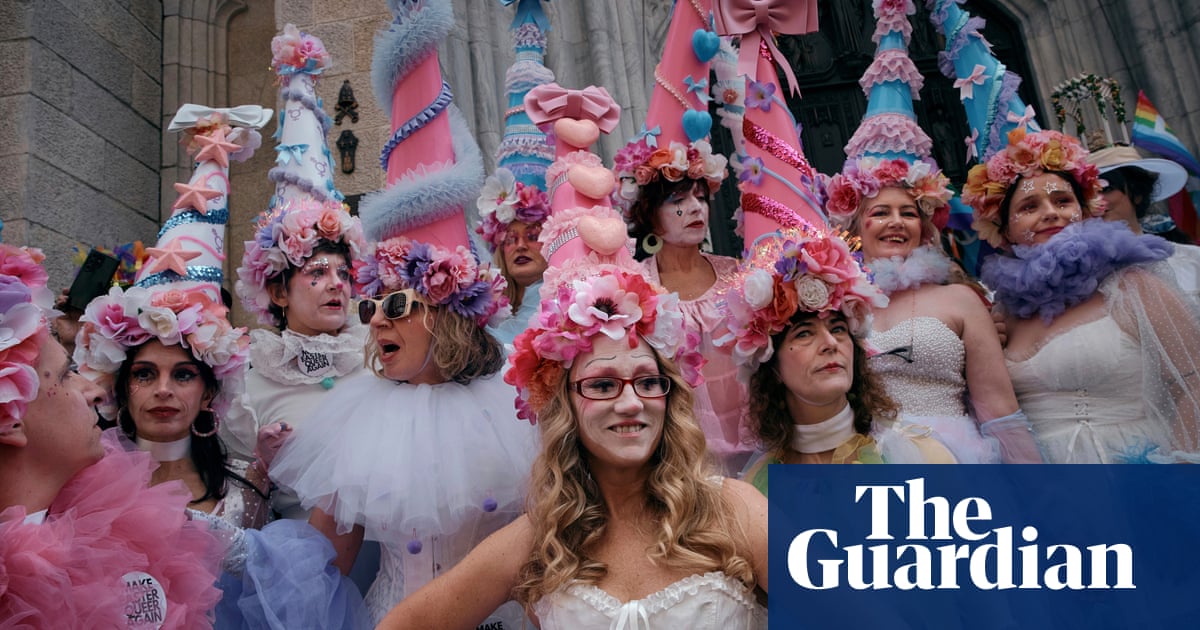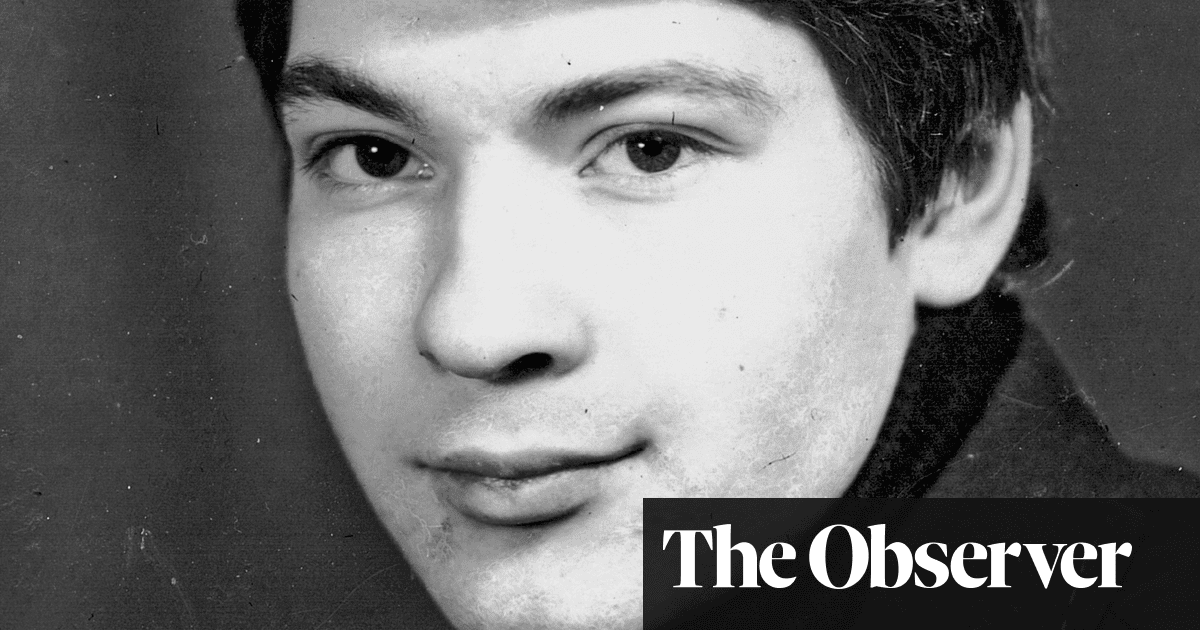Right before he began work on his second album, someone told Obongjayar it was time to “start writing songs”. “I remember being really pissed,” laughs the artist, whose real name is Steven Umoh – though, in person, he goes by “OB”. “Like, what the fuck? What do you think I’ve been doing this whole time?”
The incredulity seems fair. The 32-year-old Nigerian singer has been releasing work for more than a decade, running the gamut of genres from hip-hop to Afrobeat to experimental electronics to spoken word, alt-rock and soul. It has made him something of a critics’ darling, but if you’re not familiar with his solo music (his debut album, 2022’s Some Nights I Dream of Doors, was stunning), odds are you’ve heard his lithe, gravelly inflections on Richard Russell’s Everything Is Recorded project, or warming up UK rap star Little Simz tracks such as 2021’s glorious Point and Kill, or sampled by super-producer du jour Fred Again on the 2023 behemoth Adore U.
The last of these, which interpolated vocals from Obongjayar’s I Wish It Was Me, was eye-opening for Umoh. Appearing on stage with Fred Again to perform the track, he saw how tens of thousands of people were responding to it in real time. It was “crazy”, he says, and invaluable. “Fred knows the crux of the song, the thing that’s going to hold you and shake you, and distils it down to that. And when you see how people relate to something, how it touches people, that’s when I started to get it.” The experience drove Umoh to reconsider what it meant to “write songs” – not as a newly commercial endeavour, but recognising that art should reach people. He comes up with an analogy about aliens needing to translate their language in order to be understood and have actual impact.
Umoh is like this: pouring out long, thoughtful metaphors on the spot, gesticulating wildly, full of such sincere warmth and enthusiasm for, as he puts it, “yapping”, that he leaves the full English he ordered untouched for the entirety of our conversation – and then the ensuing photoshoot. At one point he’s waggling his hand in my face in the shape of a gun to reiterate how strongly he stands for his beliefs: “If you said you’d shoot me dead unless I said what you wanted me to say, I’d say, ‘Cool, kill me bro!’”
He has not always been this exuberant. Back in Calabar, a port city in south-eastern Nigeria where he spent most of his childhood, Umoh was extremely shy. Aged six, his family laughed at his dream of performing songs to a huge crowd. It was Umoh’s grandmother, of whom he speaks fondly, who coaxed him out of his shyness. She was his main caregiver after his mum, a survivor of domestic violence, relocated to the UK while pregnant with his younger sister. Umoh recalls her encouraging him to be less afraid. “She said, ‘There’s no point. What’s the worst that can happen?’” he recalls. The notion stuck with him, and he now thinks of shyness as its own form of self-centredness: “The only person who really cares is you.”
Today, Umoh cuts a striking figure. He is tall, beaming, dressed in an “I heart London” T-shirt, lurid green sunglasses and bulky silver jewellery. “I’ve been awake since 3am,” is the first thing he announces as he takes a seat outside the Deptford cafe he has chosen for our interview, not too far from where he lives in south London. The sun is shining, and he suspects it’s his hay fever that’s been keeping him up. He is also on the precipice of releasing album number two, Paradise Now. It’s a glorious record of big songs, from gleaming pop numbers to strutting basslines to tender quasi-bossa-nova undercut by occasional west African grooves. This is all topped with a playful, Kate Bush-esque knack for the voice as its own instrument: yelping falsettos, silky crooning, seething growls, all woven together with his trademark honeyed sweetness. The album finds Obongjayar dwelling on family, the passage of time, relationships, faith, self, his anger at the British government. None of this is a cynical rehash of Adore U; instead, it seems the lesson Umoh has learned is to whittle further into himself, toying with the bones of classic song structures, repeating the mantra: “Of me, from me, for the world.”

Surely knowing that people are about to hear the album has got to be at least somewhat stressful? “I know that I love the record,” he shrugs. “So my thinking is: it’s gonna come out and whatever’s gonna happen, it’s gonna happen. It’s like a fingerprint, it’s your voice – there’s nothing you can do about how people receive that. If it sells a million first week? Incredible. If it sells two pounds first week, it’s incredible too. I’m just in this place of contentment.” He likens the feeling to getting on stage. In live performances, Umoh exudes vibrancy, the music moving through him, a picture of confidence. “I know what I am, I know what I can do,” he says, “I wrote the songs, I love the songs – it came from me. So performing the songs is not this gigantic thing … it’s just me breathing.”
Clearly, his grandma’s words have had an effect. By the time he was 17 and had moved to Ashford, Surrey to live with his mum, Umoh was uploading raps online, putting on an American accent. He went to university in Norwich, where he began to sing in his own voice, and it was not long after that his SoundCloud began to gain traction. Still, early 2000s hip-hop was his first love, and he points to the genre as an example of what all great art should aspire to do: “When people say that a lot of white people love hip-hop or whatever? [That means] it can translate to people who have nothing to do with that culture nor have any experience or understanding of it. That’s music that has had an effect on the world.”
Umoh does not shy away from politics in his music. His first album featured Message in a Hammer, a track about the 2020 Lekki toll gate massacre in Lagos; on Paradise Now, there’s Jellyfish, a scathing song about spineless British politicians. For Obongjayar, like his heroes Fela Kuti and Bob Marley, music having a message does not mean it has to be at the expense of a good tune. “I think there was a point where I was like …” he puts on an affected, earnest voice, “‘I gotta be conscious, bro, I gotta write stuff that’s gonna change the world!’” He laughs. “Nah man, I don’t think music operates like that, or that it has the licence to do that. Saying what you feel shouldn’t come at the cost of the music. If you’re trying to hammer in a message, you’re putting yourself in front of the thing and it becomes indulgent. If you shout at people, no one gives a shit.”
Jellyfish is an engrossing, high-energy rager with distorted staccatos of electronics and percussion. Only by listening closely will you hear lines like: “My heart is watermelon” and “Bomb bomb spawned by the stars and stripes”. For Umoh, this isn’t telling people what to think, but rather expressing his own anger. “Seeing how governments move, people in power, corporations – how for whatever monetary reasons you sell yourself,” he says, hitting the table for emphasis. “I was really pissed off with how spineless Britain was in response to Israel-Palestine. Waiting for America? Why are you being such a bitch, bro? You’re in a position where you can turn the tables, where you can say, ‘That’s fucked up, that’s wrong, we don’t stand for that.’ The Conservatives, Keir, it’s the same shit – they’re so spineless and it pisses me off.”
On social media, Umoh is “Obongjayar, Devil Slayer”, but he says this is more about reckoning with his own demons. Umoh was raised as a Christian, and though he wouldn’t describe himself as such these days, his work and person is still imbued with spirituality. Album two finds cries of “hallelujah!” and reflections on prayer – and, obviously, it’s called Paradise Now. He explains: “This isn’t about paradise as a destination. I think paradise is now, it’s here, this is part of it. Every moment is an opportunity to soak in beauty. It’s not taking ‘now’ for granted, it’s your relationship with yourself and the world around you.”
For Obongjayar, success will be in his ability to communicate that sentiment through writing songs. As he says: “The most important part is being able to take my perspective on how I see the world and where I’m from, what my mind sees, and translate that vision into a language where everyone else can understand what it is. That’s peak artistry.”
-
Paradise Now is released on 30 May via September Recordings. Obongjayar tours in November

 7 hours ago
8
7 hours ago
8













































